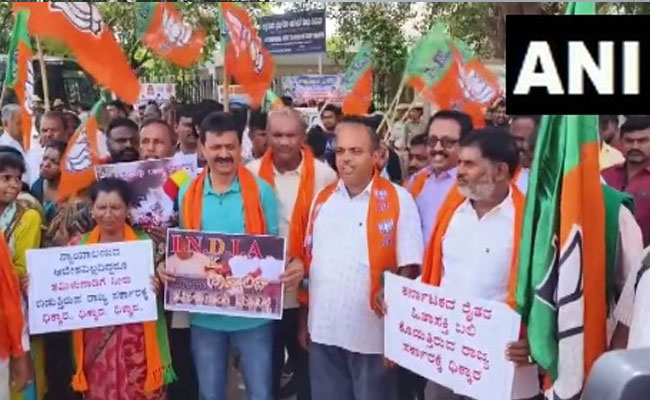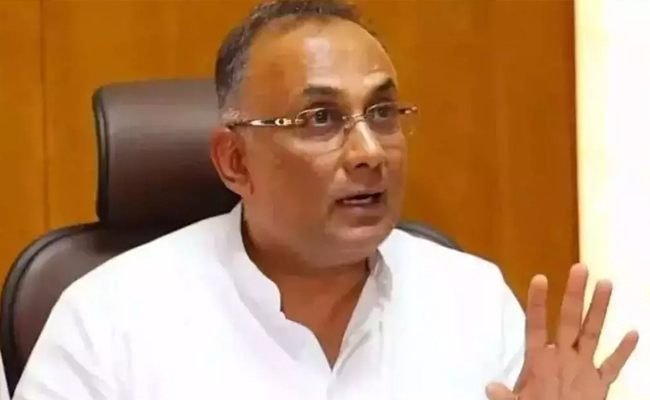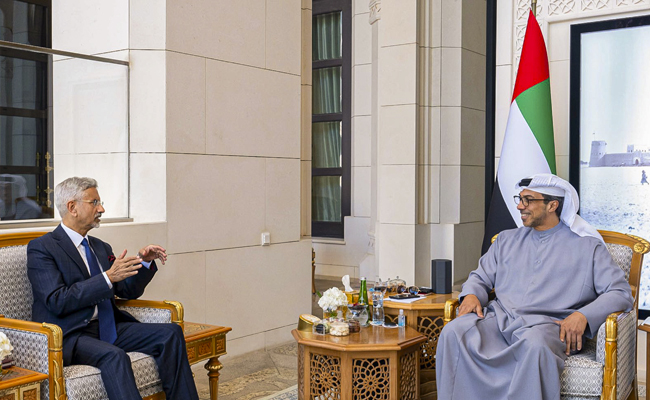Mandya (K'taka) (PTI): A large number of Karnataka BJP workers on Monday staged a demonstration and burnt the effigies of Congress leaders here for releasing Cauvery water to Tamil Nadu.
They also put up banners and posters denouncing the Congress government and raised slogans at Sanjay Circle in this district headquarters town expressing their anger against the ruling party's stand on the Cauvery issue.
The protestors put flowers on their ears to convey the message that the state government has fooled people. They alleged that the government ignored the interests of Karnataka farmers, especially those in Mysuru, Mandya and Ramanagara districts.
The independent MP from Mandya Sumalatha Ambareesh too joined the protesters.
Speaking to reporters, Sumalatha said no one should see this protest from a political point of view.
"I appeal to people not to see this from a political point of view. Everyone has a responsibility including the media. We have to protect the rights and interests of our farmers," she said.
The actor-turned-politician took a swipe at the Congress indirectly for blaming Centre.
"The Centre interfering in the Cauvery issue is a misleading information provided to you," she said.
The Lok Sabha member said when the Congress was ruling at the Centre, Cauvery controversy was "taking place" and then water was released citing Supreme Court orders. Her actor-politician husband late Ambareesh, who was in the Congress, had resigned as a union minister as mark of protest, she said.
"If Centre can resolve this issue then it would have done it in the past as well. Why did this not happen? It did not happen because the Cauvery tribunal is hearing Tamil voices more. Tamil Nadu objects to any steps taken to desilt KRS dam and we had to keep mum. If we can dredge KRS then at least 20 ft of more water can be stored," she said.
Sumalatha called upon people not to allow injustice to happen to the farmers.
The BJP said the Congress government is sacrificing the interests of farmers to woo Stalin-led DMK government in Tamil Nadu on behalf of their leader Rahul Gandhi for political reasons.
In a post on 'X' (formerly Twitter), the party said that a red-carpet welcome was accorded to Tamil Nadu Chief Minister M K Stalin, who opposes the Mekedatu balancing reservoir for drinking water to Bengaluru, only for the sake of the newly formed opposition bloc INDIA.
The focus is back on Cauvery water sharing dispute with Karnataka releasing water to Tamil Nadu though there are inadequate rains this time in Karnataka.
According to Deputy Chief Minister D K Shivakumar, the Cauvery Water Management Authority has directed the Karnataka government to release 10,000 cusecs of water everyday for 15 days to Tamil Nadu.
The Karnataka government has convened an all party meeting on August 23 to discuss the Cauvery river water sharing issue in view of the low inflow of water into reservoirs of the State following inadequate rains.
Let the Truth be known. If you read VB and like VB, please be a VB Supporter and Help us deliver the Truth to one and all.
New Delhi: A bill to set up a 13-member body to regulate institutions of higher education was introduced in the Lok Sabha on Monday.
Union Education Minister Dharmendra Pradhan introduced the Viksit Bharat Shiksha Adhishthan Bill, which seeks to establish an overarching higher education commission along with three councils for regulation, accreditation, and ensuring academic standards for universities and higher education institutions in India.
Meanwhile, the move drew strong opposition, with members warning that it could weaken institutional autonomy and result in excessive centralisation of higher education in India.
The Viksit Bharat Shiksha Adhishthan Bill, 2025, earlier known as the Higher Education Council of India (HECI) Bill, has been introduced in line with the National Education Policy (NEP) 2020.
The proposed legislation seeks to merge three existing regulatory bodies, the University Grants Commission (UGC), the All India Council for Technical Education (AICTE), and the National Council for Teacher Education (NCTE), into a single unified body called the Viksit Bharat Shiksha Adhishthan.
At present, the UGC regulates non-technical higher education institutions, the AICTE oversees technical education, and the NCTE governs teacher education in India.
Under the proposed framework, the new commission will function through three separate councils responsible for regulation, accreditation, and the maintenance of academic standards across universities and higher education institutions in the country.
According to the Bill, the present challenges faced by higher educational institutions due to the multiplicity of regulators having non-harmonised regulatory approval protocols will be done away with.
The higher education commission, which will be headed by a chairperson appointed by the President of India, will cover all central universities and colleges under it, institutes of national importance functioning under the administrative purview of the Ministry of Education, including IITs, NITs, IISc, IISERs, IIMs, and IIITs.
At present, IITs and IIMs are not regulated by the University Grants Commission (UGC).
Government to refer bill to JPC; Oppn slams it
The government has expressed its willingness to refer it to a joint committee after several members of the Lok Sabha expressed strong opposition to the Bill, stating that they were not given time to study its provisions.
Responding to the opposition, Parliamentary Affairs Minister Kiren Rijiju said the government intends to refer the Bill to a Joint Parliamentary Committee (JPC) for detailed examination.
Congress Lok Sabha MP Manish Tewari warned that the Bill could result in “excessive centralisation” of higher education. He argued that the proposed law violates the constitutional division of legislative powers between the Union and the states.
According to him, the Bill goes beyond setting academic standards and intrudes into areas such as administration, affiliation, and the establishment and closure of university campuses. These matters, he said, fall under Entry 25 of the Concurrent List and Entry 32 of the State List, which cover the incorporation and regulation of state universities.
Tewari further stated that the Bill suffers from “excessive delegation of legislative power” to the proposed commission. He pointed out that crucial aspects such as accreditation frameworks, degree-granting powers, penalties, institutional autonomy, and even the supersession of institutions are left to be decided through rules, regulations, and executive directions. He argued that this amounts to a violation of established constitutional principles governing delegated legislation.
Under the Bill, the regulatory council will have the power to impose heavy penalties on higher education institutions for violating provisions of the Act or related rules. Penalties range from ₹10 lakh to ₹75 lakh for repeated violations, while establishing an institution without approval from the commission or the state government could attract a fine of up to ₹2 crore.
Concerns were also raised by members from southern states over the Hindi nomenclature of the Bill. N.K. Premachandran, an MP from the Revolutionary Socialist Party representing Kollam in Kerala, said even the name of the Bill was difficult to pronounce.
He pointed out that under Article 348 of the Constitution, the text of any Bill introduced in Parliament must be in English unless Parliament decides otherwise.
DMK MP T.M. Selvaganapathy also criticised the government for naming laws and schemes only in Hindi. He said the Constitution clearly mandates that the nomenclature of a Bill should be in English so that citizens across the country can understand its intent.
Congress MP S. Jothimani from Tamil Nadu’s Karur constituency described the Bill as another attempt to impose Hindi and termed it “an attack on federalism.”



_vb_22.jpeg)

